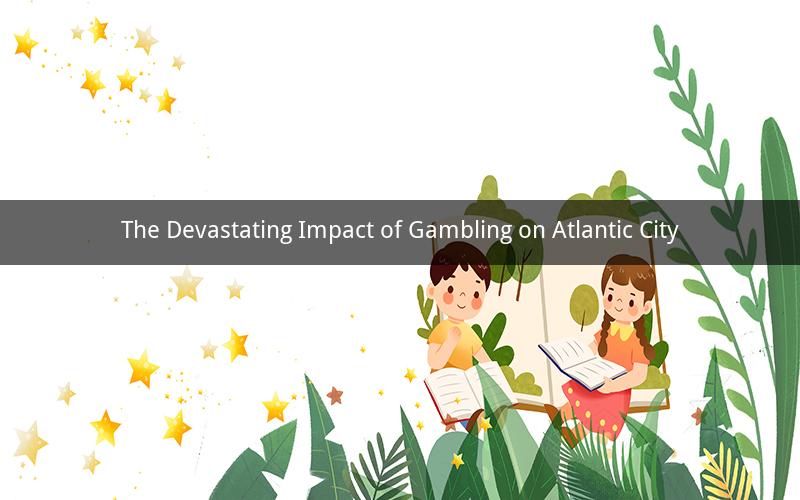
In the mid-20th century, Atlantic City, New Jersey, was a thriving seaside resort town, renowned for its boardwalk, beaches, and amusement parks. However, the rise of gambling in the 1970s and 1980s transformed the city's landscape, leading to both economic prosperity and devastating consequences. This article explores the impact of gambling on Atlantic City, highlighting its rise, fall, and the lessons learned.
1. The Rise of Gambling in Atlantic City
In the early 1970s, New Jersey voters approved a constitutional amendment that allowed for the establishment of casinos in Atlantic City. The first casino, the Resorts Atlantic City, opened in 1978, followed by a rapid expansion of the gambling industry. By the late 1980s, the city had become the nation's second-largest gambling destination, trailing only Las Vegas.
The introduction of casinos brought significant economic benefits to Atlantic City. Revenue from gambling, along with tourism and entertainment, fueled the city's growth, leading to increased employment, tax revenue, and infrastructure investment. The city's population grew, and new businesses and housing developments popped up, transforming the boardwalk into a bustling entertainment district.
2. The Downfall of Atlantic City
While the gambling industry initially brought prosperity to Atlantic City, it also led to a series of problems that eventually contributed to the city's downfall. The following factors played a role in the city's decline:
a. Overreliance on Gambling: As Atlantic City became more dependent on gambling revenue, the city government failed to diversify its economy. This overreliance made the city vulnerable to fluctuations in the gambling market.
b. Competition: The rise of Las Vegas and other gambling destinations, such as Macau and Singapore, increased competition for Atlantic City's customers. As a result, the city lost market share and saw a decline in visitors.
c. Crime and Corruption: The gambling industry attracted organized crime, leading to an increase in crime rates and corruption. This tarnished the city's reputation and discouraged tourists.
d. Urban Decay: As the gambling industry grew, the city's infrastructure and public services deteriorated. This urban decay, coupled with the city's problems, led to a decline in property values and increased poverty.
3. The Current State of Atlantic City
Today, Atlantic City faces significant challenges as it struggles to revitalize its economy. The city's gambling industry has seen a steady decline, with several casinos closing their doors. The remaining casinos have faced increased competition from online gambling and neighboring states that have legalized gambling.
Despite these challenges, Atlantic City is not without hope. The city has taken steps to diversify its economy, focusing on tourism, entertainment, and cultural attractions. The boardwalk has been renovated, and the city has hosted various events and festivals to attract visitors.
4. Lessons Learned from Atlantic City
The rise and fall of Atlantic City offer several lessons for other cities considering the introduction of gambling:
a. Diversify the Economy: Overreliance on a single industry can be detrimental. Cities should aim to diversify their economies to reduce vulnerability to market fluctuations.
b. Address Crime and Corruption: The gambling industry can attract organized crime and corruption. Cities must address these issues to maintain a safe and reputable environment for tourists and residents.
c. Invest in Infrastructure and Public Services: A thriving city requires well-maintained infrastructure and public services. Neglecting these areas can lead to urban decay and a decline in property values.
5. Questions and Answers
Q1: What was the initial impact of gambling on Atlantic City's economy?
A1: The introduction of gambling led to significant economic growth, including increased employment, tax revenue, and infrastructure investment.
Q2: What factors contributed to Atlantic City's decline?
A2: Factors contributing to the city's decline include overreliance on gambling, competition from other gambling destinations, crime and corruption, and urban decay.
Q3: How has Atlantic City attempted to revitalize its economy?
A3: Atlantic City has focused on diversifying its economy, investing in tourism and entertainment, and hosting events and festivals to attract visitors.
Q4: What lessons can other cities learn from Atlantic City's experience?
A4: Other cities can learn the importance of diversifying their economies, addressing crime and corruption, and investing in infrastructure and public services.
Q5: Is Atlantic City's future looking bright?
A5: The future of Atlantic City remains uncertain. While the city has taken steps to revitalize its economy, it must continue to adapt to changing market conditions and competition.